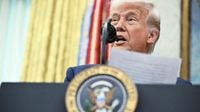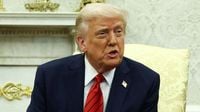A group of Venezuelan migrants in Texas has filed an emergency appeal with the Supreme Court, seeking to halt their removal under the controversial Alien Enemies Act. This action comes amid a broader legal battle over the Trump administration's use of this 18th-century wartime authority, which has drawn criticism for allegedly bypassing due process rights. The appeal represents the second time this issue has reached the high court, following a recent ruling that migrants must be given notice of their removal and an opportunity to contest it in court.
On April 18, 2025, a federal judge scheduled an emergency hearing to address claims that the administration was preparing to deport additional Venezuelans. This hearing, overseen by Judge James Boasberg, is crucial as it follows allegations from the American Civil Liberties Union (ACLU) that detainees were receiving notice of their removal with less than 24 hours to respond.
ACLU lawyer Lee Gelernt argued that the migrants were being transported in buses toward flights without sufficient notice or an opportunity to challenge their deportation. During the hearing, Deputy Assistant Attorney General Drew Ensign stated that the government had complied with the Supreme Court's previous ruling, which mandated that notice must be given, but indicated that this did not include a right to contest the removal.
Meanwhile, U.S. Secretary of State Marco Rubio indicated that the United States might cease its diplomatic efforts to resolve the ongoing conflict in Ukraine within days if no progress is made. His comments reflect a noticeable shift in the administration's approach, as President Donald Trump has expressed optimism about a potential ceasefire and is reportedly ready to recognize Russian control of Crimea as part of a framework for ending the war.
This proposal, which has been shared with European and Ukrainian officials, aims to establish a ceasefire along the front lines. It was communicated during a call between Rubio and Russian Foreign Minister Sergey Lavrov. The U.S. plans to continue discussions with European and Ukrainian partners next week in London to finalize the proposal.
In a related development, the Trump administration is preparing for another meeting between Trump’s Middle East envoy, Steve Witkoff, and Russian officials to garner support for the overall framework. However, these diplomatic efforts come at a time when public support for U.S. involvement in Ukraine is waning among Republicans, according to a recent Pew Research survey.
On the domestic front, Senator Chris Van Hollen of Maryland returned to the U.S. after meeting with Kilmar Abrego Garcia, a man who was wrongfully deported to El Salvador. Van Hollen described Garcia's experiences in the notorious CECOT prison, where he reportedly faced traumatic conditions. During a news conference, Van Hollen called for an end to what he termed Garcia's "illegal abduction," emphasizing the broader implications for due process rights in the U.S.
Garcia was mistakenly deported to El Salvador in March 2025, and his case has become emblematic of the Trump administration's hardline immigration policies. Van Hollen stated that the Trump administration has committed $15 million to detain prisoners like Garcia, with more than $4 million already disbursed. He also addressed a social media post by El Salvador's President Nayib Bukele, who mocked the meeting by suggesting that Garcia and Van Hollen were "sipping margaritas." Van Hollen clarified that the glasses were placed on the table by government officials, and they did not consume any drinks.
In response to Van Hollen's visit, President Trump criticized the senator, claiming he "looked like a fool" during his meeting with Garcia. Trump further labeled Van Hollen as "fake," reflecting the tension between the administration and Democratic leaders over immigration issues.
As the legal and diplomatic landscapes continue to evolve, the Trump administration faces increasing scrutiny over its handling of both immigration and foreign policy. While the Supreme Court's decision on the Alien Enemies Act will be pivotal for the Venezuelan migrants, the administration's approach to the Ukraine conflict raises questions about its long-term strategy in the region.
In other news, the Pentagon announced that the U.S. will withdraw approximately half of its troops stationed in Syria as part of a consolidation effort. This reduction will decrease troop levels to just under 1,000, down from around 2,000. The decision follows peace talks between the Syrian government and U.S.-backed forces in the region, indicating a potential shift in military strategy.
Additionally, the Trump administration has faced backlash over its plans to lay off nearly 1,500 employees at the Consumer Financial Protection Bureau (CFPB). A federal judge has paused these layoffs, which critics argue could undermine the agency's ability to fulfill its statutory functions. The judge ordered an evidentiary hearing to determine whether the mass firings violated existing court orders.
As the administration navigates these contentious issues, it remains to be seen how public sentiment and legal challenges will shape its policies moving forward. With the Supreme Court set to weigh in on the Alien Enemies Act and ongoing negotiations regarding Ukraine, the coming weeks are likely to be critical for both domestic and international affairs.






